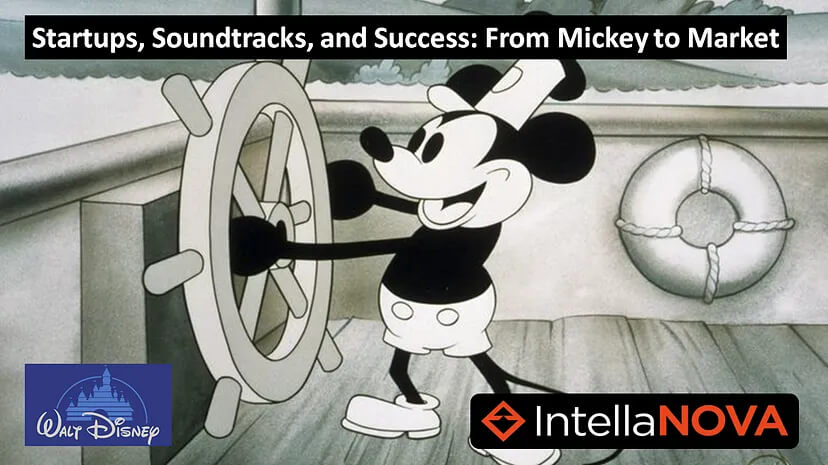
IntellaNOVA Newsletter #19 — From Unlocking the Power of Gen AI & Pancake to Lightdash and Marketing Mastery
IntellaNOVA Newsletter #19 — From Unlocking the Power of Gen AI & Pancake to Lightdash and Marketing Mastery
Unlocking the Power of Gen AI: Insights from the Google Cloud Customer Community Event
The Google Cloud Customer Community event in LA brought together thought leaders and industry experts to explore the growing influence of Generative AI (Gen AI) across various sectors. Highlights included Skechers’ data transformation journey, leveraging a Databricks lakehouse and Importa to achieve business clarity, and emphasizing the need for robust data infrastructure. Leaders like Miles Ward of SADA and executives from CoreLogic, LunarCrush, and Shutterstock discussed the role of AI in boosting productivity, fraud detection, and content creation.
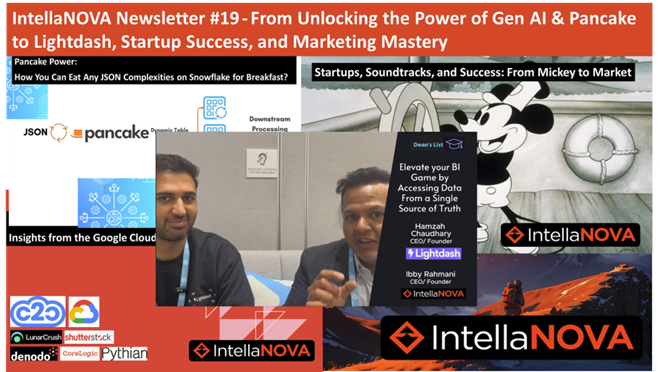
The event also covered the evolution of AI from simple models to complex multi-agent systems, with discussions on how companies like Riot Games are using AI to automate tasks and enhance gaming experiences. A key takeaway was that businesses must build solid data foundations and focus on real-world applications to successfully implement AI, while collaboration and shared insights drive future advancements.
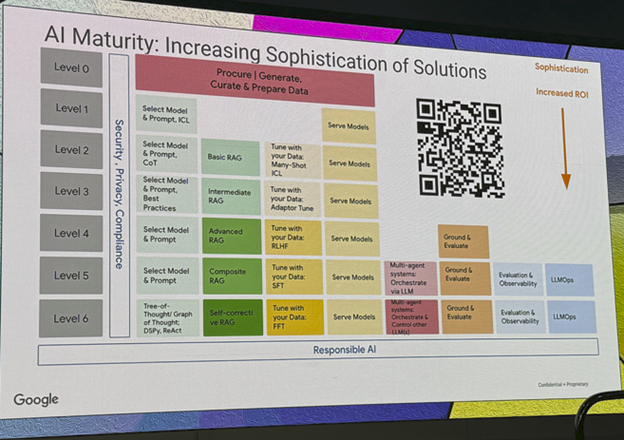
Elevate your BI Game with a Single Source of Truth: An Interview with LightDash CEO Hamza Chaudhary
At the Snowflake Summit, I interviewed Hamzah Chaudhary, CEO and co-founder of LightDash, an open-source BI tool that emphasizes creating a single source of truth to ensure data consistency across teams. LightDash tackles the common BI issue of inconsistent metrics, such as revenue, by enforcing immutable data definitions that are accessible across various tools. Unlike traditional BI systems that lock business logic within the tool, LightDash enables seamless data sharing with other applications while maintaining consistency. Hamzah highlighted how LightDash integrates BI into a company’s data operations from the outset, ensuring governance and reliable metrics before data reaches the dashboard. A key example involved a RevOps team using LightDash to align finance and customer success teams with consistent revenue metrics, leading to more effective collaboration. As businesses increasingly demand reliable, consistent data, LightDash is revolutionizing BI by providing tools that reduce data silos and enable better decision-making.
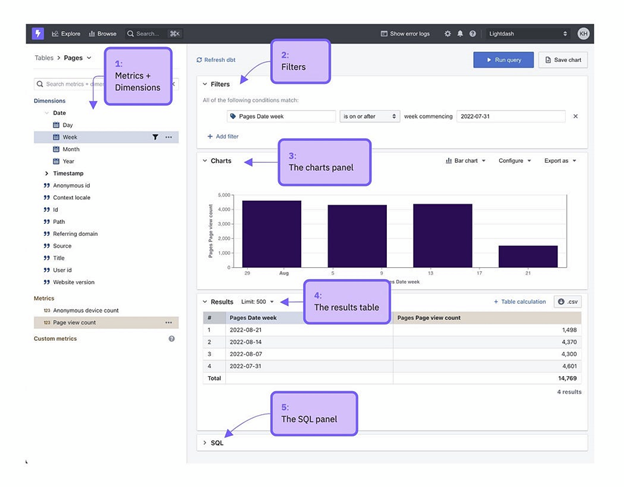
Pancake Power: How You Can Eat Any JSON Complexities on Snowflake for Breakfast?
Pancake, a tool from Snowflake’s Native App Accelerator, simplifies complex JSON data management by automating schema discovery, data structuring, and SQL code generation, making JSON pipelines easier to build and maintain. JSON’s flexible schema, while useful, often creates inconsistencies that can slow down analysis, but Pancake addresses these challenges by mapping JSON data to the appropriate Snowflake types, even handling nested structures and dynamic fields. In real-world scenarios, Pancake can analyze complex JSON datasets within seconds, split them into relational tables, and continuously monitor for schema changes. Pancake’s features, such as real-time monitoring and SQL code automation, help data engineers save time, reduce errors, and maintain resilient workflows within Snowflake, transforming JSON processing from a bottleneck to a seamless part of data operations.
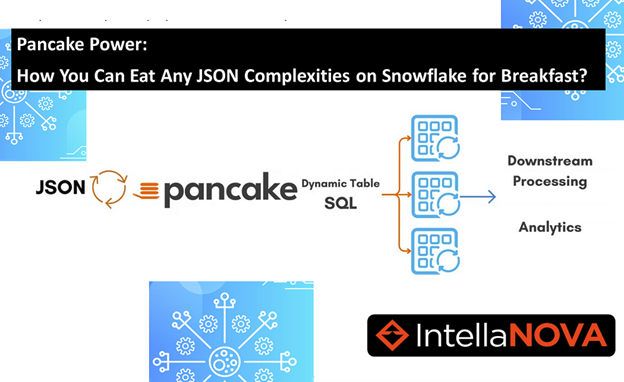
Striking the Right Balance: Short-Term Success and Long-Term Value in Startup Marketing
After working in several startups, I noticed that while many focus heavily on short-term gains, such as closing deals, boosting revenue, and building momentum, these immediate wins, though crucial for attracting investors and maintaining cash flow, can sometimes overshadow long-term strategies that foster sustainable growth. Short-term victories like quick revenue boosts, PR spikes, and acquiring early adopters can drive excitement and validate the product, but solely chasing them can lead to reactive marketing that fails to build a strong foundation for future success. Long-term value, on the other hand, involves building brand equity, customer loyalty, and scalable infrastructure, ensuring your company remains relevant as the market evolves. Successful startups balance short-term wins with long-term strategies by setting dual goals, measuring beyond immediate metrics, investing in brand-building early, leveraging short-term wins for long-term success, and adapting to market changes without abandoning their long-term vision. By cultivating both short-term agility and long-term resilience, a startup can not only survive but thrive in the competitive tech landscape.

Startups, Soundtracks, and Success: From Mickey to Market (MVP)
Picture yourself as Walt Disney, who after losing the rights to his first character, Oswald the Lucky Rabbit, learned that ownership is everything in business. Determined to retain control, he created Mickey Mouse, whose debut wasn’t backed by a massive budget but by innovation and belief in his vision.
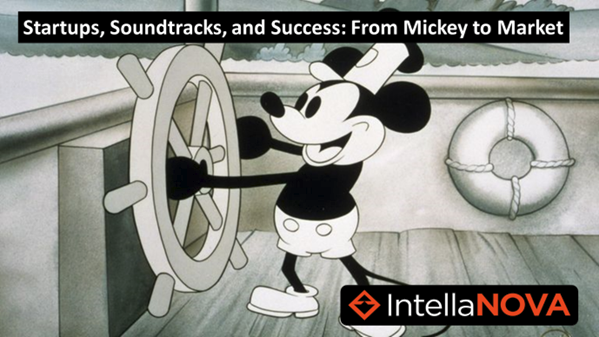
This led to Steamboat Willie, a breakthrough in synchronized sound cartoons, setting a new industry standard. Similarly, launching a Minimum Viable Product (MVP) is a startup’s Steamboat Willie moment: it may not be perfect, but it showcases your vision and opens the door to future growth. Like Disney, who transformed animation, Google introduced the PageRank algorithm, reshaping internet searches despite entering a crowded market.
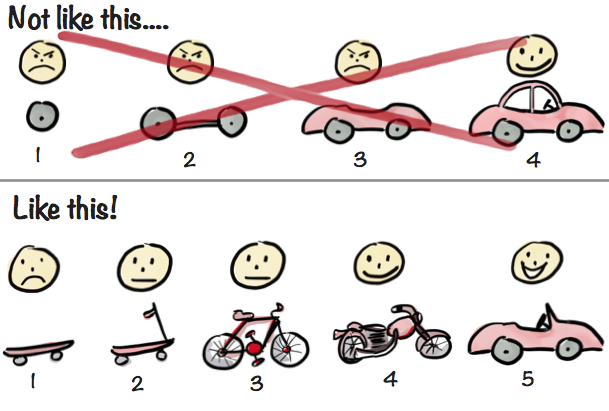
Both stories show that early success isn’t about being perfect but about innovation. Your MVP is just the beginning, laying the foundation for future growth, much like Disney’s early cartoons paved the way for his legendary films.

